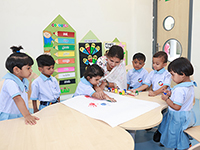Keeping your child happy and safe is important, but there’s more to it when it comes to parenting. Your main role is to prepare them for the future. And here is something interesting—studies show that children who help with household chores at ages 4-5 tend to develop higher self-confidence later in life.
Children learn through experience, so why not make everyday moments learning experiences? Read on to learn some simple parenting tips that can make your child become an independent individual.
Cooking Together
Participation of children in the kitchen is one of the best family activities for teaching responsibility. Children who assist with meal preparation will be more aware of healthy eating habits. You can begin by allocating jobs such as washing vegetables, measuring ingredients, stirring batter, or some other easy tasks.
As they get older, introduce them gradually to grocery shopping and knife skills (under strict supervision). All these parenting tips can inculcate valuable science and time management skills among young minds. This could be really helpful for securing admission to the best international schools in Nagpur.
Gardening as a Family
Gardening is a great way to create a sense of environmental responsibility in your child. You can assign age-specific activities to them. For instance, allocate seed-planting tasks to older children. Let kids take care of the watering process.
Several studies found that gardening can improve the mental health of students significantly. And it’s an ideal way to get them out of doors and off screens!
Household Chores and Responsibilities
Giving children chores teaches them the fundamentals of work ethic. Simple family activities like making their bed or setting the dinner table teach them discipline. Gradually add more significant tasks as they mature to foster responsibility.
Planning Family Outings and Trips
Let your child be part of family trip organisations as it improves their decision-making skills. You can allow them to plan destinations or prepare a packing list. That makes them feel important. It is also an effective way to expose them to practical lifetime skills like budgeting.
Creative Problem-Solving Activities
Puzzles and craft building are great ways to build problem-solving skills from a young age. In addition to that, teach them to brainstorm solutions to actual problems— how to repair a broken toy or how to design a new system for storing their room.
Get your child to solve problems on his own before you intervene to assist him. That encourages children to think critically and would be really helpful during the admission procedure in schools, as most institutions value these skills.
Encouraging Independent Play
Independent play is pretty important for the cognitive development of the child. As kids keep themselves engaged, they are capable of warding off boredom without becoming restless. That’s also a great way to improve their creativity.
A safe area can be prepared in which toys, as well as art supplies, are placed. Leave them on their own to explore. Engaging a certain period without TV screens can promote their own sense of creativity and decision-making capacity naturally.
Teaching Financial Literacy
Financial management is a basic life skill to learn for child development. You can give them some small allowance to teach them how to save and spend money. See if they are able to save for small goals. A child who has financial literacy right from a young age will have the money management skills required for the future.
Also Read: The importance of Co-curricular activities at Bangalore International School
Encouraging Reading and Research
Reading is a proven way to improve the cognitive ability of a child. In the same manner, children who are given exposure to daily reading will develop stronger academic capabilities and vocabulary. You can inculcate reading habits daily by experimenting with various genres. Always allow children to choose their books.
At the same time, make them research any topic of their choice from reliable sources to promote curiosity and an analytical mind. Remember, reading and research skills are pretty important factors in getting admission to a reputed preschool in Nagpur.
Setting Goals and Tracking Progress
Goal-setting is an important trait to learn perseverance and motivation for child development. You can set realistic goals— be it performing better in school, acquiring a new school, or so on— to improve confidence among the children. Just make sure that the goals are broken into small milestones to make them engaged.
Open Communication and Problem-Solving Discussions
As a parent, you must always have open communication on how your child feels. Many experts state that parenting styles that prioritise communication will set a protective environment where children feel comfortable speaking out. You can ask, “How did that make you feel?” or “What can you do differently next time?” All these can build emotional intelligence among children.
Conclusion
Placing all these activities into your child’s daily routine provides a foundation for the life skills they need in the future.
At Global Indian School, we pay more attention than just academics. We follow a curriculum that integrates practical learning along with strong values to enable children to possess all necessary life skills. Let’s build a brighter future for your child!

 Nagpur Campus
Nagpur Campus

















